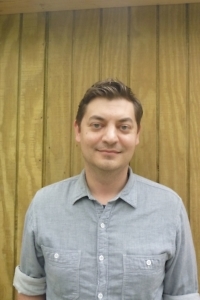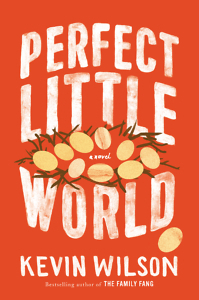“It takes a village” is an unbearable cliché at this point, but it became one because most parents desperately long for more guidance and support than they get. The idea of a helpful, loving community is irresistible, especially in this socially fragmented, techno-crazed culture. Wouldn’t it be great to construct such a community, one that actually functioned as a family and shared all the work of parenting? What could possibly go wrong? Quite a bit, according to Kevin Wilson’s second novel, Perfect Little World.
 Isabel Poole, known as Izzy, is just out of high school and pregnant courtesy of Hal, her weird but adored art teacher. When Hal goes tragically AWOL, she’s left on her own, working in the pit of the Whole Hog BBQ in Coalfield, Tennessee, and going home each night to the house she shares with her deeply depressed, widowed father. Through the machinations of Hal’s chilly family, Izzy’s situation comes to the attention of Preston Grind, a child psychologist who’s setting up a carefully monitored experiment in communal childrearing. His Infinite Family Project will bring ten newborns and their parents to a compound outside Nashville, where they all will live and grow together, their every need met for the decade of the study. When Grind offers her a spot in the program, Izzy can’t afford to say no.
Isabel Poole, known as Izzy, is just out of high school and pregnant courtesy of Hal, her weird but adored art teacher. When Hal goes tragically AWOL, she’s left on her own, working in the pit of the Whole Hog BBQ in Coalfield, Tennessee, and going home each night to the house she shares with her deeply depressed, widowed father. Through the machinations of Hal’s chilly family, Izzy’s situation comes to the attention of Preston Grind, a child psychologist who’s setting up a carefully monitored experiment in communal childrearing. His Infinite Family Project will bring ten newborns and their parents to a compound outside Nashville, where they all will live and grow together, their every need met for the decade of the study. When Grind offers her a spot in the program, Izzy can’t afford to say no.
Dr. Grind is no evil scientist, but he is distinctly odd, the product of an experiment himself. His parents were psychologists who specialized in childhood trauma — both studying it and, as it turns out, inflicting it on their son. Their Constant Friction Method of Child Rearing, meant to make little Preston more adaptable and resilient, consisted of inflicting on him all manner of unpredictable discomforts and deprivations, like having his food snatched away or being handcuffed and made to search for the key. Training away his impulse to protest or complain was part of the method. Adulthood brought yet more trauma, and all this suffering has left Grind a man who feels that “if he were to take the emotions and anxieties that were inside him and place them next to the exterior calm of his actual body, it would be terrifying to behold.”
 Izzy, in spite of a lingering loneliness, is happy enough in Grind’s “perfect little world,” but the rest of the adults have a bit of trouble with anger management and impulse control, not to mention jealousy over the children and each other. These troubles should seem inevitable to anyone familiar with humans, but it all comes as an unwelcome surprise to the good doctor. The tragic joke here is that the behavioral scientist is unprepared for all the messy behavior he helped to create.
Izzy, in spite of a lingering loneliness, is happy enough in Grind’s “perfect little world,” but the rest of the adults have a bit of trouble with anger management and impulse control, not to mention jealousy over the children and each other. These troubles should seem inevitable to anyone familiar with humans, but it all comes as an unwelcome surprise to the good doctor. The tragic joke here is that the behavioral scientist is unprepared for all the messy behavior he helped to create.
Grind has unwittingly furthered a cycle. His parents let an idea get ahead of their own feelings and instincts, with sorry results for their child. And he, in turn, tries to realize a consoling idea for helping children that winds up crumbling under the burden of chaotic feelings and instincts. The Infinite Family is just part of an intellectual and emotional Ouroboros.
And yet, the novel hints that there is some escape to be found from such a cycle of sorrow. Izzy’s native honesty and emotional courage serve her well as the group’s family dynamic gets wonky. There’s an earthy modesty in her character that protects her from the drama. She’s the youngest adult in the group, but she has the fewest illusions, and she is, as she puts it, “so fucking strong,” in spite of—or maybe because of—being so minimally parented herself.
Readers of Wilson’s previous novel, The Family Fang, will recognize the same themes—blinkered intellectuals, self-indulgent parents and their struggling children—but in many ways Perfect Little World is a complement to its predecessor. In Grind we get to see what drives the obsession with an idea. The visionary here is more fully human, kinder, though still entirely too willing to toy with children’s lives. Wilson has sanded some of the edge off the humor in this book, but the compensation is a greater richness in the characters, and a refreshingly un-ironic attitude toward love.

Maria Browning is a fifth-generation Tennessean who grew up in Erin and Nashville. A graduate of Mount Holyoke College, she has attended the Clothesline School of Writing in Chicago, the Moss Workshop with Richard Bausch at the University of Memphis, and the Sewanee Writers’ Conference. She lives in White Bluff.
Tagged: 2017 Southern Festival of Books, Fiction





